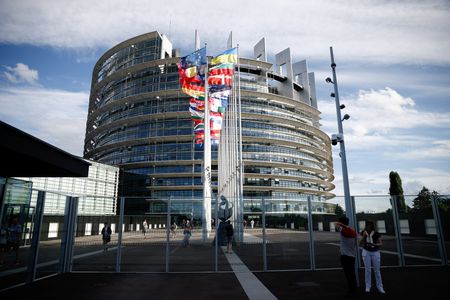By Kate Abnett and Inti Landauro
BRUSSELS (Reuters) -The European Parliament’s legal committee on Monday backed plans to water down the EU’s corporate sustainability law, which is facing pushback from companies that say complying with the rules would hinder the competitiveness of European industries.
The European Union’s corporate sustainability due diligence directive (CSDDD) was adopted last year and requires companies to fix human rights and environmental issues in their supply chains, or face fines of 5% of global turnover.
In the vote on Monday, lawmakers in the European Parliament’s legal committee approved proposals that would make the rules mandatory only for companies with 5,000 or more employees and at least 1.5 billion euros ($1.74 billion) in turnover.
Currently, CSDDD applies to companies with 1,000 or more employees and above 450 million euros in turnover. The committee also backed dropping a requirement for companies to carry out “transition plans.”
CUTTING COSTS FOR BUSINESS
“The (conservative) European People’s Party’s goal has always been to simplify rules and cut costs for businesses,” said Jorgen Warborn, the lawmaker who drafted the text approved on Monday. “Our vote today will create more predictability for our businesses in an unpredictable world.”
The committee requested that the European Parliament now start negotiations on the final rules with EU countries, without a full vote of the assembly. A group of lawmakers equivalent to a tenth of the assembly could still decide to force a vote next week.
Some of the changes already appear likely to pass. EU countries have already said they support changing the law to apply only to companies with 5,000 or more employees.
The CSDDD has become one of the most politically contested parts of Europe’s green agenda, with countries including the United States and Qatar demanding changes. They argue that the EU is overstepping by imposing requirements on foreign companies.
European companies including TotalEnergies have demanded that the EU scrap the law entirely, warning it would hurt the bloc’s competitiveness.
But the walk-back has met resistance from some investors and activists, who say it weakens corporate accountability and hits Europe’s ability to attract investments toward meeting climate goals.
“If such changes are ultimately adopted, this law will be stripped of its very purpose for short-term political convenience,” said senior lawyer Amandine Van den Berghe of nonprofit law firm ClientEarth. “What is a cornerstone of responsible business in Europe is being turned into a political bargaining chip.”
(Reporting by Kate Abnett and Inti Landauro in Brussels; Editing by Benoit Van Overstraeten and Matthew Lewis)










